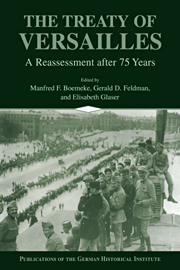Book contents
- Frontmatter
- Introduction
- Prologue: 1919-1945-1989
- PART ONE PEACE PLANNING AND THE ACTUALITIES OF THE ARMISTICE
- PART TWO THE PEACEMAKERS AND THEIR HOME FRONTS
- PART THREE THE RECONSTRUCTION OF EUROPE AND THE SETTLEMENT OF ACCOUNTS
- PART FOUR THE LEGACY AND CONSEQUENCES OF VERSAILLES
- PART FIVE ANTECEDENTS AND AFTERMATHS REFLECTIONS ON THE WAR-GUILT QUESTION AND THE SETTLEMENT
- 22 Max Weber and the Peace Treaty of Versailles
- 23 The Construction of the American Interpretation: The Pro-Treaty Version
- 24 British Revisionism
- 25 Woodrow Wilson's Image of Germany, the War-Guilt Question, and the Treaty of Versailles
- 26 A Comment
- Bibliography
- Index
22 - Max Weber and the Peace Treaty of Versailles
from PART FIVE - ANTECEDENTS AND AFTERMATHS REFLECTIONS ON THE WAR-GUILT QUESTION AND THE SETTLEMENT
Published online by Cambridge University Press: 05 January 2013
- Frontmatter
- Introduction
- Prologue: 1919-1945-1989
- PART ONE PEACE PLANNING AND THE ACTUALITIES OF THE ARMISTICE
- PART TWO THE PEACEMAKERS AND THEIR HOME FRONTS
- PART THREE THE RECONSTRUCTION OF EUROPE AND THE SETTLEMENT OF ACCOUNTS
- PART FOUR THE LEGACY AND CONSEQUENCES OF VERSAILLES
- PART FIVE ANTECEDENTS AND AFTERMATHS REFLECTIONS ON THE WAR-GUILT QUESTION AND THE SETTLEMENT
- 22 Max Weber and the Peace Treaty of Versailles
- 23 The Construction of the American Interpretation: The Pro-Treaty Version
- 24 British Revisionism
- 25 Woodrow Wilson's Image of Germany, the War-Guilt Question, and the Treaty of Versailles
- 26 A Comment
- Bibliography
- Index
Summary
The following observations are intended as a modest contribution to a subject that is of undiminished political significance even today, namely, the historical assessment of the Treaty of Versailles and its repercussions in German political and historical consciousness. The impetus for these remarks is the recent discovery of new sources during research on the collected works of Max Weber. The scope of these new sources is not great, but they are grounds for a reassessment of the treaty from the perspective of recent German history.
During the 1920s, the Treaty of Versailles was viewed by all German parties, with only minor exceptions, as a “dictate of shame,” the conditions of which were designed exclusively to keep Germany permanently in punitive bondage and to prevent it for the foreseeable future from rebuilding itself into a European superpower. The conclusion, recorded unmistakably in the treaty, that the German Reich was to blame for the outbreak of the war was viewed as far more intolerable than the admittedly extremely harsh material conditions. It touched upon a point of honor that was all the more sensitive since the great majority of Germans had rushed to arms in 1914 in the sincere personal conviction that they were fighting a war of self-defense. Moreover, German misery in the period between the Avars, particularly the inflation and later severe economic and social crisis of the early 1930s, was, and still often is, generally considered to be the main cause of the collapse of the Weimar Republic.
- Type
- Chapter
- Information
- The Treaty of VersaillesA Reassessment after 75 Years, pp. 535 - 546Publisher: Cambridge University PressPrint publication year: 1998
- 23
- Cited by



